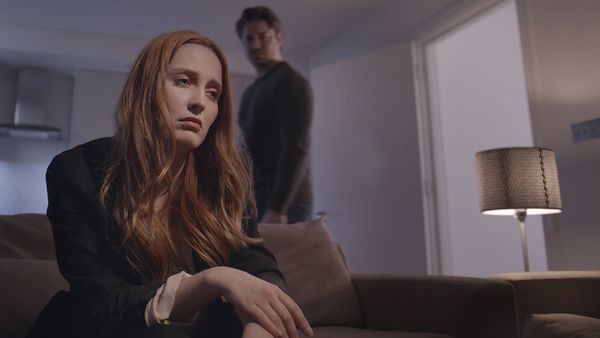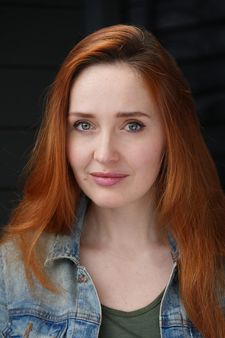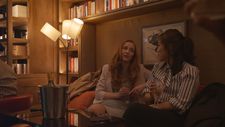 |
| Tatjana Anders and Kyle James in Your Reality |
It’s an old story. Boy meets girl. Boy and girl fall in love. Girl moves in with boy. Boy gradually cuts her off from all her friends, destroys her confidence and makes her feel completely dependent on him so that he can get away with behaving however he likes. Curiously enough, though the phenomenon takes its name from a film (based on a play) – Thorold Dickinson’s 1938 thriller Gaslight, remade in the US by George Cukor six years later – there are relatively few in recent history which have tackled it head on. Tatjana Anders wrote short film Your Reality in an effort to fill the gap.
Directed by Top Tarasin, the film follows Alicia (played by Anders herself), a young woman who stumbles into a relationship with a man who seems to adore her, only to find herself increasingly confused and distressed, unable to work out what’s going wrong but, due to her partner’s confidence, willing to accept that it must be her fault.
 |
| Tatjana Anders |
“The idea of gaslighting in a relationship was inspired by the story of a really good friend of mine, but I didn't copy her story as such,” Tatjana tells me. “I just saw what that relationship did to her and how much it affected her. I put two and two together, that it was a manipulative relationship and the ex boyfriend was always using these gaslighting techniques on her. She would constantly doubt herself and not sure about what was real. He kept telling her that she was overreacting and saying that she was being crazy, behind her back.
“He was cheating on her and all that kind of stuff – she found out later, once it broke up. Back then, she was just really confused. But it led me to do research around that topic. And when I started doing that research, I realised how much more there is to it, how intense this topic is, and that it requires more awareness, so that's how the story came together.”
She agrees that it’s a subject that cinema has neglected.
“I think there is a lot of gaslighting present in film, but it's not about gaslighting. And another thing that I also like, you could argue that Gone Girl or Girl On The Train have elements of gaslighting. But what I didn't like about it is that there's always murder involved, and I feel like then it becomes like a crime thing, and I don't think that many people can relate to it because, well, they’ll think ‘My ex boyfriend didn't kill anyone’ or ‘I didn't kill anyone.’ So, ‘That's not really me’ or ‘It's not really my story.’ So I wanted for the gaslighting and manipulations to be subtle and relatable. That was my main objective, that people could see themselves in the characters, mainly in the main character. Maybe some people see themselves in the perpetrator as well.”
I suggest that it would be good if they did and recognised it was a problem.
“You know what?” she says. “I have read some comments where people say ‘I feel like I've been doing what this guy is doing to her, to someone.’ I wonder that it could be a false positive, but I don't know, maybe it's true. And if it is true, I'm glad that people are able to recognise it and rectify their behaviour. How amazing would that be? On the other hand, it's also possible that people who are being gaslit actually think that they're the ones in the wrong.”
I tell her that I like the fact that Alicia is working in marketing. She's a very together kind of person, and she's also interested in psychology, so she seems like the sort of person who would notice something like this happening to her – and of course, lots of people think that they would notice and then they don't.
“That was really important to me,” she says. “I wanted to take a character who, from the outset, doesn't seem to be as susceptible to it, and also has her life together at work, at least when they meet, and seems to be very capable and seems to be very on top of everything. For me personally, I feel like it was important to see that anyone can be trapped in this kind of behaviour. You don't have to be someone who is insecure. I think it does actually happen to people who are relatively confident, and you can also be very confident in work but actually not as confident in your personal life. That's something that I see a lot.
 |
| Waiting for him to call |
“I think that's probably what I was driving at with the main character because it seemed like she was very successful at work and everything was going her way. But then I implied that she didn't really have much luck on the dating front, and she felt the pressure that she had to meet someone soon because she's getting older. I think that a lot of women experience that kind of pressure because you have this thing from society where if you're not married or if you don't have any kids by a certain age, then it's going to get much harder to find someone. And some people panic, and then they settle for someone who's not good for them.”
There’s a little comment that Alicia makes to a friend, early on, about how her mother's always judging her and putting pressure on her. That seems to be setting her up to be vulnerable in some ways.
“I think so. I mean, I used her mom, but really a lot of the time it's just society or just the pressure from seeing your friends getting married and getting kids. You're maybe the only one who in your age group or from your school or uni who is still single. I got married last year, but my parents have been like, ‘What's going on? When are you going to have kids?’ I'm like, ‘Just give me a break!’ So I think that was a little bit from personal experience as well.”
How did she decide how to introduce the gaslighting techniques so that they wouldn’t be obvious from the start, given that audience members will have differing levels of familiarity with them?
“I wanted for it to be quite subtle,” she says. “I did a lot of research. I read so many books. I watched so many videos. I tried to soak up as much as I could. And I read forums as well, people just sharing their stories. And I tried to understand both the people who experience gaslighting and obviously, the narcissists, in terms of understanding the psychology of how they operate.
“A lot of the time, in the beginning, they shower you with compliments, shower you with flowers and gifts and tell you how amazing you are. That you're their soulmate. And that's the reason people fall for them and are trapped by them, because if they were nasty to them from the very beginning, then you’d just tell them to eff off.
“In the beginning, they're the most charming person you could ever meet. And once they know that they have you, that's when they start getting nasty. So I think for me, I just really wanted for the dialogue and for all these red flags to be as subtle as possible. Also, because I know that these things don't happen overnight. I mean, it's a short film, and you could argue even there that things escalated quickly, but that’s just because I didn't have time. Sometimes it takes years, sometimes it takes months to reveal itself, the gradual way they break down your confidence. So it was important for me that it was believable.”
She’s hoping to make a feature-length version of it.
“We're in the process of trying to get the funding for it and lining everything up. We've got the script already. We've got locations. We've got, obviously, the director and the casting director also lined up, but the financial stuff always takes the longest. Hopefully this year or next year, fingers crossed. I'm doing my best.”
Fitting a story like this into a short was trick, she acknowledges. She had to prioritise carefully from the start.
 |
| Alicia with her friend Sophie in happier times |
“I think it was important to see the before and after. That's why we had to jump time, and we tried to do it through visual cues rather than, like, ‘six months later...’ That was just the director. He didn't want to have any text. He was of the opinion that it's lazy filmmaking. So were trying to make it flow naturally. We put photos of them together around the set. You can expect that there's been a history. It's not like they just met literally and moved in after one day. It's like they've been dating for a while.
“But then, you know, at the same time, gaslighters usually do push people to move in as quickly as possible because the more control they have over you, the quicker they get what they want.
“It is really tricky to create this story in just a short period of time, and I think that's why a feature length just makes so much more sense for this type of story. We would have time to develop the characters properly, and also we’d have time to follow the relationship once it becomes obvious what's going on. And also we’d have time to give the film a proper ending. What's going to happen once she finds out, or when the gaslighter knows that she's onto him?
“We can also get a little bit of background on the families and where these people come from. Why is it that the relationship came together? What is it in the gaslighter that made him this way? Because people don't get born like that. I don't believe that. I don't think that people are evil when they are babies. I think that something makes them that way, and I think that's also something that needs exploring and understanding. Not to have empathy, particularly with these type of people, but to understand where this vicious cycle starts. I think when you do understand, you have to realise that the only way to stop it is to, I guess, prevent having children with gaslighters. Gaslighters often use children as their weapon. They weaponise them to manipulate their spouses, and then children get messed up from that, and then it's a vicious cycle.”
There’s a very powerful moment in the film where we see two versions of the same scene back to back.
“The reason I did it that way is because throughout the short film, I wanted for the audience to see things from the perspective of the protagonists – and the truth of it is that the protagonist isn't sure what's happening. They believe what they're being told, right? Because when you are being gaslit, you lose the sense of what is real and what is actually happening. You start doubting yourself and then you doubt yourself more. When people tell you convincingly that this didn't happen or you're making it up, at some point, after days or weeks or months, you start to believe them and you stop believing yourself or trusting yourself and trusting your own instincts.
“This is the feeling I wanted to give the audience when they watch it. And then in the end, just show them that maybe that is not the reality. So hence the name Your Reality, because it's all about the perception of whose reality are we in and who is creating this reality for you.”
Tatjana has encouraged people to try meditation techniques as a way of coping with negative emotions and figuring out where they really come from.
“For me, guided meditation has helped a lot with overcoming certain things and I guess rebalancing myself. It's almost like you try to counteract what has been happening to you or what people have been telling you because really, a lot of things, I think, happen on the subconscious level. If someone keeps telling you're not good enough or you are too stupid or you can't do anything on your own, you know, ‘You'll never survive without me,’ etc., after a while, when you keep hearing the same things over and over, you start internalising it and you just fall apart inside.
 |
| The pressure of self-doubt |
“I think that, especially when you are in a relationship like this, the first step really is to stop, and build up that blockade again of ‘No, I am good enough. I know what my reality is. I know that I'm not crazy.’ Also, you have to prioritise your own happiness. People get so used to suffering and they also get so used to pleasing other people at the expense of themselves. So I think there needs to be a slow shift to them thinking ‘Okay, no, I have to put myself first. I have to do something that's good for me and not for them.’
“You can constantly dance around and try and make them happy, and obviously they'll never be happy because they just want you to suffer. I think that guided meditation is a really good way to get started with that process because it works on a more subconscious level, and this is the level you have to address.”
Does she think that, if people see films like this and have more awareness of how gaslighting works, they can keep themselves out of these situations? Or is it something that's so subtle in the way it builds up that it's impossible to see it coming?
“I think it totally is possible,” she says. “I think you can recognise red flags. And the more you see these patterns, the more information you see and the more portrayals of it you see out there, the easier that gets. That's why I hope that the film has helped. I know it has because people have reached out to me and told me. But I think that if you're not aware of it, you’re completely exposed. When you do know about it, you can build up your defence mechanisms and just be like, ’You know what? I am not going to accept this kind of behaviour.”
It’s more complicated if the gaslighter is a family member, she acknowledges, but she feels that it’s quite possible to resist getting trapped by a friend or family member.
“There is always a way to exit this relationship and be like, ‘You know what? If you're not making me happy, you're being abusive and manipulative or whatever, why would I entertain having that kind of relationship?’ That's the sort of feeling that I want to impart to people.





















